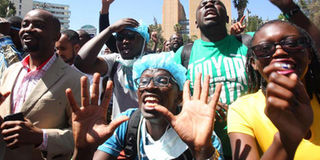Wrong approach to blame for delay in ending doctors’ strike

Doctors demonstrate in Nairobi on January 12, 2017. They are demanding salary increase. PHOTO | EVANS HABIL | NATION MEDIA GROUP
What you need to know:
- KMPDU is demanding full implementation of the collective bargaining agreement (CBA) it signed with the government.
- The Treasury CS said the government is economically constrained and can only afford the 40 per cent increase it offered.
I had convinced myself that I would not comment on the doctors’ strike that is now entering its third month until I read a comment by Treasury Cabinet Secretary Henry Rotich on the matter.
Initially, I had assumed that the issues on the table were too obvious to deserve a comment.
By now, you have probably heard all the arguments.
On the one hand, the Kenya Medical Practitioners, Pharmacists and Dentists Union is demanding full implementation of the collective bargaining agreement (CBA) it signed with the government.
On the other hand, we have a government whose reputation for profligacy has even inspired the doctors’ clarion call of “Lipa kama Tender”.
As you might recall, former US President Barack Obama noted during his visit to Kenya in 2015 year that “Corruption is a crisis in Kenya and it undermines economic growth, health care delivery and the future”.
The Treasury CS said the government is economically constrained and can only afford the 40 per cent increase it offered.
“If everyone who goes on strike is paid what they demand, then we can’t go on living in this country.”
In principle, we can all agree with the government’s position on two fronts.
One is that economic development is necessary to generate jobs and to invest in health, education and other public services.
Two, considering the high wage bill, the country will grind to a halt if the government gives in to the demands of all the striking workers.
Countries such as Brazil, China and India that made significant progress towards achieving their Millennium Development Goals in health rode on a wave of fast economic growth in the 1990s.
INVEST IN TECHNOLOGY
According to reliable studies, sub-Saharan Africa is home to a quarter of the world’s disease burden, but only three per cent of it are medical workers.
One of the most valuable and powerful assets any country wishing to improve the health of its people should invest in is its workers — doctors, nurses and allied staff.
I draw an important lesson from this — but it’s not what you think.
Yes, we need to pay doctors better, not because it will improve things, but it is the right thing to do.
There is no country in the world that has enough doctors available to employ, let alone resources to pay them. In the long term, we need to think creatively.
What comes to my mind is investment in new technologies that automate tasks and reduce doctor-patient encounters.
I have in mind technologies like Remote Patient Monitoring (RPM) systems like smart bandages that anticipate wound infections or intelligent beds that detect pressure and alert the nurse to turn the patient to avoid bed sores.
Telemedicine is another promising technology that allows remote diagnosis and treatment.
A specialist doctor in Nairobi using a smartphone’s video and voice features could, for instance, speak with a patient in Busia and make a critical diagnosis.
There is also the application of ‘Internet of things” where patient-generated health data such as activity levels, sleeping patterns, blood sugar and blood pressure are linked to electronic health records for use by doctors.
In addition, there are technologies like predictive analytics and artificial intelligence that although not yet here, show promise.
POOR STRATEGY
Predictive analytics could provide insights into which patient is sickest or what the best treatment is, and reduce the need for a bedside doctor at all times, especially at night or during weekends.
The technology can predict how a patient with blood pressure is likely to respond to medication, or send alerts about a patient who might need admission to an intensive care unit in the next 36 hours.
All said and done, I lived through the 1993 doctors’ strike that lasted a record nine months, to understand that ultimately, practising medicine is a calling to serve the neediest in society and the demands of a dysfunctional system — poor pay, lack of drugs and equipment and long working hours — should not be allowed to trump this vision.
If there is no silver lining for now, it is because the government’s approach to resolving this impasse is solely premised on the ancient Chinese policy of sitting on the riverbank to wait for the enemy’s body to float by.
Dr Obwogo is a senior quality improvement adviser in health policy and systems strengthening. [email protected]; [email protected]





